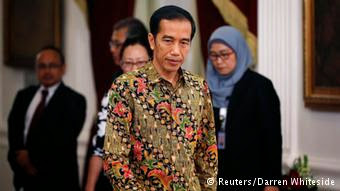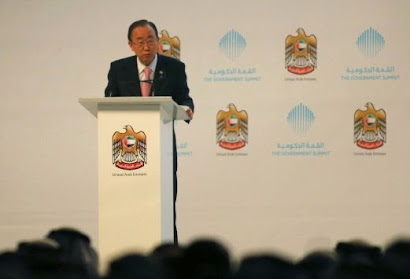Deutsche Welle, 15 Aug 2011
 |
Villagers protest against visitors
to their forest |
The
Indonesian government needs the support of its indigenous peoples to reforest
its devastated woods. But they have become suspicious of visitors examining
trees. They fear a sell-off to foreign investors.
Angry
villagers shout, clench their fists and wave banners at a group of
international visitors who have come to see the Mejet Forest on the northern
part of the Indonesian island of Lombok.
This isn't
the reception that the visitors were expecting. The international collection of
forestry officials and NGO experts came with good intentions – to take part in
a conference aimed at forest conservation.
They want to
visit a successful project, but the villagers are disgruntled and suspicious.
They believe the tour is aimed at stirring interest among potential foreign
investors, looking to buy land.
This has
often been the case in the past.
After much
to and fro, the forest tour is cancelled. Instead, visitors and villagers meet
with the local regent.
A life-long
affinity
This is
where disputes are traditionally settled, and the villagers become calm.
They hear
about the visitors' true motives - to learn. It's something the villagers are
happy to address: They fear for their livelihood and many have invested a lot
to make use of the forest.
 |
The villagers want to protect the
forest for their children |
Using the
forest is something the villagers take for granted, but it is considered a big
problem for the Indonesian government.
The
Indonesian forest ministry estimates that there are about 33,000 villages
located on or nearby forested areas owned by the state.
According
to the law, they are using the forest illegally, even though they have been
living there for many generations.
In order to
solve the problem, the Indonesian government has offered to lease the forest to
the indigenous population.
The local
villagers get the right to use a particular woodland in return for committing
to take care of it.
But what
happens if the forest used is also part of a wildlife sanctuary or a
traditional site?
Protecting
the forest from within
At the foot
of Rinjai, the second highest vulcano in Indonesia, lies the village Santong
and the Santong Forest.
A trail
leads deeper into the forest. It is bordered by tall trees rising to the sky.
They serve as a protective shield for coffee, banana and vanilla plants.
 |
The locals grow coffee and vanilla
in the Santong Forest |
To boost
reforestation, the population here uses agroforestry, a combination of
agricultural and forestry techniques, since 1996. The forest covers about 221
hectares, but the indigenous people are allowed to use just 140 hectares, as
the remainder is protected landscape. About 260 families live on the forest's
yield.
Everything
appears to be in harmony. But there are areas of conflict, according to
Masidep, a representative of the local Lombok tribe Sasak.
"Most
of them think about profit only," Masidep says. But for the indigenous
people, the forest's protection is of much higher value. "We need to
conserve the forest and also water resources, because water is giving life.
Everyone needs to respect that," he says.
Traditional
custodians
The Sasak
tribe is an ethnic group that makes up 85 percent of the inhabitants on the
Indonesian island Lombok.
Masidep is
proud to announce that he can track his line of ancestry back to the 17th
Century. In this area, the Sasak clans have been guarding the forest for
centuries. Traditionally, the Rangga family is responsible for protecting the
forest, says Rangga Topan Yamanullah.
The Sasaks
can prove that they have been living in Lombok for a very long time.
"There are traditions about old rituals: If you enter the forest, you have
to clean yourself first. There are certain days and times, when it is favorable
to go. It was different from today," Rangga Topan Yamanullah says.
"Today,
it is only considered important what individuals are earning. We on the other
hand are here to conserve the balance of the world."
 |
This river is a sacred site
for the Sasak |
The Sasaks
feel that preserving the forest is part of their life-task. But of all the
people using Santong Forest, only a third are Sasak. Most are migrants from
elsewhere in Indonesia. The Sasaks hope that the Indonesian government will
provide them with the same rights to use the forest as the rest of the
population.
But they
also expect the government to protect their sacred sites and prevent the
forests from being turned into just another source of production for the
economy.
A race
against time
The Santong
Forest example shows that a lot of problems remain unresolved. Who owns the
right to use the forest, where are the borders that separate one forest from
another, and how can the local population help promote conservation without
suffering economic loss?
The
Indonesian government has yet to answer these questions.
And time is
running out: Indonesia loses a million hectare of forest per year, despite
introducing a two-year moratorium on cutting down trees.
International
surveys show that the best stewards are those people who have been living
within the forest for generations. So it makes sense for the Indonesian
government to team up with the indigenous community.
Erna
Rosdiana from the Directorate of Social Forestry Development says the forest
ministry is working on solutions. The visit to Lombok has opened her eyes to
many of the problems. She says she plans to return with something to show, and
hopes for a warmer reception next time around.
Author:
Ziphora Robina /sst
Editor:
Nathan Witkop
















